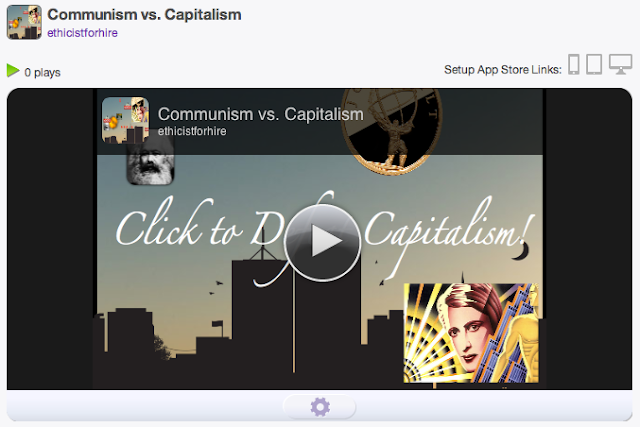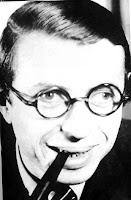"If we have any hope of learning how these things happen and thereby preventing them from happening again we have to discard this fantasy that there are monsters out there," says Oppenheimer, "that we just have to be vigilant and lock them up and maybe kill them or put them in camps.
"In calling someone a bad guy I reassure myself that I'm good. I elevate myself. I call it the 'Star Wars morality'. And unfortunately it underpins most of the stories we tell." [...]
"I care about him," [Oppenheimer] says. "It's hard to call our relationship a friendship. I was trying to expose a regime of impunity on behalf of a community of survivors, while Anwar was trying to run away from his pain, to build up a cinematic psychic scar tissue around his trauma. I may not exactly like him, but I have love for him as another human being."
To say that The Act of Killing is "disturbing," is of course an understatement, but what precisely is so disturbing about it?
 |
| Getting ready for their closeup... |
From another perspective, what is so disturbing is the role that the audience (Oppenheimer directly, the rest of us indirectly) play in these reenactments. As A. O. Scott writes:
Some queasiness may linger at the thought of a Western filmmaker indulging the creative whims of mass murderers, exploiting both their guilelessness and the suffering of Indonesians who remain voiceless and invisible here. But this discomfort is an important indicator of just how complicated, how perverse, the cinematic pursuit of truth can be. This is not a movie that lets go of you easily.
Who is directing who?
Oppenheimer is right to argue that Congo and the rest of his friends and associates are not "monsters," and that to indulge in the "fantasy" of their monstrosity is to "reassure myself that I'm good." But is this the argument of The Act of Killing?
The Act of Killing focuses, not on the structural causes of the purge, not on the role that the West played in supporting the purge (passively or actively), but on a handful of the individuals who perpetrated the purge. These individuals discuss with Oppenheimer (who never appears onscreen, thus never allowing us to see how he responded to what was unfolding before his eyes) their love of American movies, the inspiration they drew from the violence of these movies, and how important it is and was to them that "gangster" means "free man." As they move from discussion of movies to making one of their own it becomes apparent that, though they are now old men, these individuals nevertheless remain their teenage selves, teenage selves who still need to show off. Given cameras, a crew, and a captive audience, their reenactments quickly escalate from displaying torture techniques to burning down a village. As they construct scene after scene of interrogation, torture, and devastation—of each other and of whoever they can get to "volunteer," like children reenacting movie scenes as they leave the theater—the line between "play torture" and "actual torture" gets less and less clear and we become more and more riveted.
But are we riveted because we're hoping that the true depravity of their acts will finally become clear to them as they move from torturer to tortured, or are we riveted because with each wire noose they put around the neck of an "actor" we are forced to fear that we have paid tickets, not to a documentary, but to a snuff film? Perhaps the answer is irrelevant. For what catharsis and pornography have in common—from the perspective of the audience—is waiting for the "money shot," whether the final outburst be emotional or erotic. Congo and Oppenheimer provide us with tease after tease until climax is reached in the end, but should this climax leave us feeling satisfied that even someone who confesses to have killed 1000 people with his bare hands is still capable of an empathetic revelation, or should it leave us feeling frustrated in the discovery that it is we, the audience, who have been reenacting what happened 50 years ago, reenacting the West's enabling of the conversion of ordinary thugs into extraordinary war criminals?
Oppenheimer has surely provided us with a truly thought-provoking documentary. I only wish the thoughts provoked were closer to what he said in his aforementioned Guardian interview, rather than to what Anwar's friend Ady said in one of his many justificatory statements: "'War crimes' are defined by the winner." And given Ady's readiness to be brought before The Hague, we should perhaps further be wondering whether The International Court of Justice, much like this documentary, would not merely provide Anwar, Ady, and the rest of them with yet another stage to act out their teenage fantasies upon. Yet the ICJ, unlike this documentary, might lead to Truth and Reconciliation, rather than to John Waters-inspired musical numbers and forcing the children of the purged to relive the horrors of their parents in the hopes of making one or two retired torturers cry.
The Act of Killing focuses, not on the structural causes of the purge, not on the role that the West played in supporting the purge (passively or actively), but on a handful of the individuals who perpetrated the purge. These individuals discuss with Oppenheimer (who never appears onscreen, thus never allowing us to see how he responded to what was unfolding before his eyes) their love of American movies, the inspiration they drew from the violence of these movies, and how important it is and was to them that "gangster" means "free man." As they move from discussion of movies to making one of their own it becomes apparent that, though they are now old men, these individuals nevertheless remain their teenage selves, teenage selves who still need to show off. Given cameras, a crew, and a captive audience, their reenactments quickly escalate from displaying torture techniques to burning down a village. As they construct scene after scene of interrogation, torture, and devastation—of each other and of whoever they can get to "volunteer," like children reenacting movie scenes as they leave the theater—the line between "play torture" and "actual torture" gets less and less clear and we become more and more riveted.
But are we riveted because we're hoping that the true depravity of their acts will finally become clear to them as they move from torturer to tortured, or are we riveted because with each wire noose they put around the neck of an "actor" we are forced to fear that we have paid tickets, not to a documentary, but to a snuff film? Perhaps the answer is irrelevant. For what catharsis and pornography have in common—from the perspective of the audience—is waiting for the "money shot," whether the final outburst be emotional or erotic. Congo and Oppenheimer provide us with tease after tease until climax is reached in the end, but should this climax leave us feeling satisfied that even someone who confesses to have killed 1000 people with his bare hands is still capable of an empathetic revelation, or should it leave us feeling frustrated in the discovery that it is we, the audience, who have been reenacting what happened 50 years ago, reenacting the West's enabling of the conversion of ordinary thugs into extraordinary war criminals?
Oppenheimer has surely provided us with a truly thought-provoking documentary. I only wish the thoughts provoked were closer to what he said in his aforementioned Guardian interview, rather than to what Anwar's friend Ady said in one of his many justificatory statements: "'War crimes' are defined by the winner." And given Ady's readiness to be brought before The Hague, we should perhaps further be wondering whether The International Court of Justice, much like this documentary, would not merely provide Anwar, Ady, and the rest of them with yet another stage to act out their teenage fantasies upon. Yet the ICJ, unlike this documentary, might lead to Truth and Reconciliation, rather than to John Waters-inspired musical numbers and forcing the children of the purged to relive the horrors of their parents in the hopes of making one or two retired torturers cry.




























